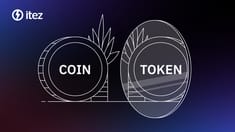In recent weeks, the Indian regulator has increased pressure on offshore cryptocurrency exchanges in the country. Thus, on December 28, 2023, India's Financial Intelligence Unit (FIU) accused nine international cryptocurrency exchanges of not having licences for operating in the country: Binance, Kucoin, Huobi, Kraken, Gate.io, Bittrex, Bitstamp, MEXC, and Bitfinex.
On January 10, the apps of all of these exchanges were blocked in the local Apple App Store. On January 14, they were banned from Google Play. At the same time, the platforms' websites have not been blocked in India yet. Notably, among those removed is the OKX exchange, which was not in the FIU notice.
How Binance, Kucoin, Huobi and others violated AML laws in India
As per the March 2023 order, crypto exchanges that are virtual digital asset service providers (VDA SPs) were brought under the Anti Money Laundering/Counter Financing of Terrorism (AML-CFT) framework. This obliged them to register in India and stop being offshore.
On December 28, 2023, the FIU asked the Ministry of Electronics and Information Technology to block access to the websites of nine crypto exchanges operating illegally and not complying with the Prevention of Money Laundering Act (PML). The list includes Binance, Kucoin, Huobi, Kraken, Gate.io, Bittrex, Bitstamp, MEXC, and Bitfinex.
As of now, the websites of the mentioned exchanges are available in India. However, last week, the App Store and Google Play marketplaces removed some apps for Indian residents. Thus, the App Store removed the apps of Binance, KuCoin, Bitget, Huobi, OKX, Gate.io, and MEXC. Google Play, to date, has only blocked the Binance and OKX apps. The removal of the latter is particularly odd, as it is not mentioned in the FIU notification.
Crypto regulation in India seeks to control the sphere
As of April 1, 2022, India has a harsh crypto tax policy: a 30% tax for citizens and a 1% tax deduction at source (TDS) on each trade. The latter means that the exchange is required to pay 1% of every customer transaction to the government.
Due to these strict rules, local exchanges in India are no longer in demand, and all the activity went to offshore exchanges.
As mentioned above, from March 2023 and further on, these exchanges have to become more accountable to the government. As a result of non-compliance with the rules, the Indian regulator began to put pressure on exchanges, probably with the aim of stimulating their registration in the country and returning interest to local, legal platforms.
That said, India is not banning cryptocurrencies or blockchain in general. For example, Bengal's New Town Kolkata Development Authority and startup Airchains plan to use NFTs to confirm land ownership.
However, the country's policies are aligned in the quest for complete control over cryptocurrency in the country and beyond. During the recent G20 summit, the Indian government called for global cooperation on cryptocurrency regulation.
Indian exchange CoinDCX to seize the moment and poach users
Despite the fact that users' funds on the mentioned exchanges are safe and the exchanges are surely negotiating with regulators (for instance, Binance writes about it), risks still remain, and users may withdraw their cryptocurrency through sites that are still available.
The founder of the Indian exchange CoinDCX announced in his X a promotional campaign to attract users from offshore exchanges to the local one.
So, he created a $1 million fund to reward those who make a deposit on CoinDCX between January 9 and 18. They will get a bonus of 1% of the deposit, but no more than INR 10,000 (about $120).
All in all, the cryptosphere continues to attract the interests of states. Not surprisingly, special attention is paid to exchanges, where many people start their introduction to crypto. In general, close cooperation between governments and exchanges is common worldwide, especially on taxation issues. For example, in the summer of 2023, authorities in the South Korean city of Cheongju confiscated cryptocurrency from individuals who had unpaid taxes. In November 2023, the Kraken exchange transferred the user data of 42 thousand users to the US Internal Revenue Service (IRS).
👀 You might also like:
What's the deal with Binance, and what are its chances to survive
Bybit suspends operations in the UK due to crypto ads regulation








